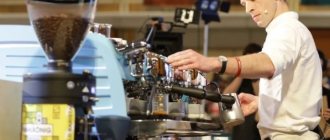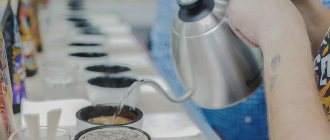The history of the barista profession
Initially, the barista profession originated in Italy. However, it became famous thanks to Howard Schultz, the founder of Starbucks, who visited Italy in 1980 and was delighted with the beauty of making coffee. He filmed all the elements of preparing and serving the drink and showed it in America, thereby the coffee shop soon began to flourish and generate even more income.
Barista and establishment owner rolled into one – a common occurrence
In Europe, baristas are men aged 30 years and above, since in the West this activity brings quite high profits. Also, the fact is that a barista in Europe is not a job, but a vocation. Basically, a barista in Europe is both the owner of a cafe and a waiter and cleaner. In Russia, baristas are mostly girls aged 18-23 years old.
Today in Italy there are even family clans that grow coffee beans themselves, prepare and roast them with their own hands, and know a huge number of variations in preparing coffee drinks.
Where do they teach
There is no provision for professional education in this field yet. For career growth and employment, having a diploma in a related field will be useful. For example, a waiter, a bartender, a specialist in organizing catering services. Directly to obtain a profession, you need to apply for specialized courses. They are hosted by various training centers, coffee shops, and restaurants.
Participation in various shows and competitions plays an important role in honing a barista’s professional skills. Even simply attending such events is enough to gain experience, new knowledge, and interesting ideas.
A barista must be able to evaluate the nuances of taste and aroma of coffee. To do this, you need to navigate the varieties, know the different regions of grain growth, and the degree of roasting.
What should this specialist do?
The main thing in the work of a barista is working with visitors. It is important not only to be able to make coffee, but also to do it beautifully and charge the client for a positive day. The barista must know how the coffee beans were prepared, where they came from, how they were prepared, how and how long to store the coffee beans, etc.
A professional should understand what coffee grind is needed to prepare different variations of coffee. And of course, the most important task of a barista is the exclusive mastery of a coffee machine, be it a regular coffee maker or professional equipment for making coffee.
A professional barista knows how to create any pattern on the surface of coffee
One of the excellent professional qualities of a real barista is mastery of the art of latte art. When drinks with an espresso base are painted with beautiful designs of milk or cream on the foam. Thus, a real barista must not only be a specialist in making coffee, but also a good psychologist, showman and designer.
What should a barista be able to do?
- Prepare about 40 varieties of coffee;
- Know all the intricacies of making coffee;
- Be able to determine the degree of roasting of coffee by smell;
- Distinguish between coffee varieties and the origin of the beans;
- Be able to make drawings on coffee foam, that is, master the art of latte art, etc.
The barista knows the secrets of making all types of coffee
What kind of person is a barista and what does he do?
In any coffee shop that offers guests an invigorating drink, the coffee machine is operated by a person who knows almost everything about the product. He can prepare not only traditional espresso, but also many cocktails based on it - cappuccino, latte, etc. From the hands of an experienced coffee maker you can get a cup of drink, ornately decorated with cream.
A barista is someone who makes coffee. Although he stands behind the counter, his duties do not include serving customers at tables (there are waiters for that), selling baked goods, washing dishes, or doing anything else. But often those working in coffee shops combine several responsibilities.
average salary
The average salary of a barista in the Russian Federation is 30,000 rubles. The maximum salary is received in Moscow and the Moscow region, as well as in the Kamchatka Territory. Their salary is about 35,000 rubles. The minimum salary in St. Petersburg is 26,000 rubles per month.
In Kazakhstan, the average salary of a barista is 23,000 rubles. The fact is that there are no professional courses for baristas in the country, so new ones have to be trained by specialists in master classes or sent for an internship abroad.
Baristas are usually paid hourly
In the United States of America, the average salary is 900 rubles per hour. Thus, the average salary of a barista in the USA is 175,000 rubles per month. In America, the work of a barista is valued much more than in Russia and the CIS countries.
In Italy, the work of a barista when preparing regular espresso is estimated at 1,200 rubles per hour. In addition, every coffee shop has a tip box, where Italians leave fairly good tips.
How much can a barista earn?
A coffee maker can earn on average from 1,000 to 2,000 rubles per shift. Payment depends on the city and place of work, skills and tips. You can earn the most money at outdoor events, for example, on City Day, your salary can be 5,000-7,000 rubles.
In the US, one shift can bring a coffee maker $8-13. Argentine baristas earn an average of $480 per month, French baristas, like in America, Romanian baristas, no more than $420.
How to learn to brew coffee?
Anyone can become a professional barista; you just need to have the desire to work in this field. There are four ways to learn skills: on your own, on-the-job training, in courses, and at universities.
You can sign up for barista courses
You can learn on your own by reading various literature about making coffee, watching videos and attending various master classes. In addition to the theoretical part, you need to have a large number of hours of practice. The more practice, the higher the skill.
One of the best ways to learn the art of making coffee is to find an open position at a coffee shop. Typically, professional coffee shops will be happy to train people who are ready to work as baristas for free. One of the main qualities when applying for a job is a pleasant appearance, knowledge of several languages, friendliness and sociability.
It is more effective to immediately get a job as an intern in a cafe
There are also special courses where you can learn to be a professional coffee connoisseur, master the art of making coffee and coffee drinks, and also learn a way to design espresso called latte art. Such courses are quite expensive, since basically everything is carried out in practice using special professional equipment.
There are also special schools and universities for future baristas. Basically, the training will be useful individually and no longer for ordinary workers behind the bar, but for future owners of the company, who must understand all the intricacies of making coffee, as well as finding the necessary equipment and ingredients for a future coffee shop.
Individual training allows you to learn the basics of the profession in record time
How to become a barista?
There are several ways to get a profession. The most common one is to learn everything on the job, becoming an apprentice chef barista. The remaining options are more suitable for foreign countries; in Russia, such an opportunity is available in large cities.
At work
In many coffee shops, owners prefer to train coffee makers themselves. In this case, the new employee will comply and will not have to waste time and effort on retraining. Training with renowned chef baristas is also valuable. Having learned from such a person, you can easily find a job by referring to his name.
The training is free and often lasts a week. A day can range from a few hours to a full 12 hour shift. Certificates are not issued, but they are not particularly needed. In this profession, the main thing is skills and knowledge, not a piece of paper with a stamp.
Special courses
In a number of Russian cities, special courses are organized to teach the profession of a barista. They don’t help with job placement, but they do issue paper confirmation of completion of training. Course duration – from 1 day.
You can also study online. After payment, a person receives a link to his personal account, goes through lessons sequentially, and completes homework. The organizers provide feedback, pointing out errors and shortcomings.
You can choose different programs:
- Basic;
- Professional barista;
- Expert;
- Chef barista.
Academic programs
For those who decide to learn the profession thoroughly, there are also more advanced versions of training. Some require knowledge of the basics of bartending.
Some examples of accredited educational institutions:
- Russian branch of SCAE, St. Petersburg;
- St. Petersburg Bartenders Association;
- Northwestern Coffee Company, St. Petersburg;
- Institute of Coffee and Tea, St. Petersburg;
- Academy of Coffee Art, St. Petersburg;
- St. Petersburg College of Economics and Technology;
- Siberian Hospitality Association, Krasnoyarsk.
Equipment used by a barista in a cafe
The quality of equipment in a coffee shop shows what quality of coffee will be offered to the visitor. Thus, you need to choose the highest quality equipment to ensure that customers return to the coffee shop again and again. The main equipment is a professional coffee machine, in which various coffee preparation functions will be available.
One of the main tools for a barista is a coffee grinder with a dosage for direct extraction into a horn. Thus, all the taste and smell from the beans will be transferred to fresh coffee, where the smell of future coffee will not evaporate and the taste will be even richer.
It is imperative to use fresh, purified water for making coffee, so it is better to keep the filter close to the coffee maker for convenience.
A tamper is a special tool for pressing and compacting ground grains in a holder. They must be made of metal so that the taste of the prepared coffee is exquisite and does not change its taste when in contact with other elements. Usually the tamper is stored next to the coffee maker, as it is constantly needed for use. And usually a special mat is used to press the coffee in the holder so as not to scratch the tools.
A pitcher is a special container with a spout for frothing milk, which is subsequently poured into coffee or used to prepare drawings on coffee using latte art.
To create drawings on coffee, you will need a pitcher
Be sure to use dry wipes to wipe down all the tools used to make coffee after each use. And constantly clear your work area of coffee and milk that accidentally gets on the table.
Coffee and health
While attending barista school, I could drink 35 cups of coffee a day. Of course, there was no need to drink them all to the bottom, you just had to try the drink. I didn't have any major health problems because I drank a lot of coffee while I was still working as a cook. But for the guys who were not yet accustomed to such volumes, everything was not very good. They came to class and said: “I haven’t slept for two days! I don’t know how to live further!” To avoid getting sick from coffee, you need to drink a lot of water, eat a lot of fatty foods, bananas help a lot. During our studies we had an hour break when we were literally forced to go eat.
If you drink a lot of coffee, over time you develop tolerance and it no longer invigorates you, you have to “increase your dose.” That’s why most people who drink latte sooner or later switch to cappuccino and so eventually reach black coffee. Everyone knows that coffee activates the brain and gives a surge of energy, but when the effect of caffeine wears off, apathy appears. Among our regular customers there are coffee lovers who take Hario in the morning, and then they will definitely come back for another portion in the evening.
We sometimes warn guests that they should not drink coffee, for example, we tell pregnant women about the risks. A woman often comes to us with a girl of about 11 years old and takes raf for her. In general, it is better not to drink coffee until the age of 16, so we add the minimum possible amount of espresso to her drink.
Who is the best barista in the world
World barista championships are held annually for various titles. For example: “best roaster”, or “barista of the year”, or “flavor champion”.
World Championship finalist from France Charlotte Malaval. She was the first non-professional barista to enter the competition, entering in the last minutes of the entry deadline. Before preparing for the competition, she took several lessons from professionals from her country. She is only 23 years old and has only worked in this field for a couple of years. She took part in last year’s championship and took third place, and this year she already took first place. She believes that in this matter the most important thing is to constantly improve in your field and not stand still.
Charlotte Malaval is a two-time World Barista Championship finalist.
The second finalist of the world championship was the owner of several coffee shops in England, whose name is Maxwell Colonna-Dashwood. He is unique in that none of his performances repeat the previous ones. That is why everyone looks forward to his performance every year. He devoted an entire book to coffee making. In one of his speeches, he dressed in a white coat, like a doctor’s, and gave a lecture on the benefits of coffee and its components.
Another finalist in the world championship was Australian candidate Sasa Sestic. He prepared for the world championship for a year. And I worked in this field for about 2 years. He studied with the UK champion via Skype for a whole year and spent a large number of hours practicing making coffee and coffee drinks. You can follow the work of specialists on their personal pages on social networks.
Sasha Shestic won the championship in 2015
Description and characteristics of the profession
Introduction to the profession often begins with an explanation of what the word “barista” means. However, the literal translation from Italian - bartender, a person working behind the bar - does not entirely accurately reflect the modern understanding of the functions of a specialist.
Nowadays in Russia this word is most often used to describe coffee masters in cafes who specialize exclusively in coffee drinks and their serving. In European and, in particular, Italian traditions, the meaning of the word expands. There, this term can refer to both the owner of a coffee shop and the bartender who prepares both coffee and alcoholic cocktails. Sometimes a barista combines several functions. In Russia, a job description may also oblige a barista to serve coffee and wash cups as an employee. Therefore, it is more correct to look for the difference in the scope of concepts not in the set of functions “there” and “here”, but in the philosophy and method of forming an idea.
Howard Schultz, distributing the Italian format in his network of coffee shops, was fascinated not just by the fact of making coffee. He was captivated by the style of creating the coffee drink, the artistry and atmosphere of the establishment. To see who a barista in a cafe is, from Schultz’s point of view, you need to imagine a charismatic alchemist who, in his laboratory, by strictly following the recipe, creates a special composition, while the action itself looks like witchcraft. Such a person knows everything about coffee and can reveal the secrets of selecting beans, methods of drying, storing, roasting, and grinding. Making coffee becomes a way of self-expression for him.
In a more prosaic sense, the position of a barista comes down to knowing the recipes for about 40 coffee-based drinks and the ability to prepare them using a coffee machine and other professional equipment.
Ideally, this specialist should know everything about coffee and the process of its preparation, take into account the tastes of visitors and advise the variety or blend that best meets the client’s needs.
In practice, when hiring, exhaustive knowledge may not be necessary. However, a professional barista, in any case, must be fluent in operating a coffee maker, coffee machine, pitcher (special container for milk), grinder (professional coffee grinder) and other devices, understand the principle of their operation, know the terminology and have an understanding of the varieties and types of grain, the influence of grinding, roasting and water temperature on the taste of the product.
What could a barista do in the future?
Typically, baristas become those who want to open their own coffee shop in the future. At the moment, the job provides good prospects and allows me to save up to open my own business making coffee and coffee drinks. Most of the coffee shop's visitors are guests who know coffee. Also, participation in coffee-making championships provides good material support.
The profession of a barista in the modern world is necessary for consumers, and this cannot be replaced by a simple Turk and a cheap coffee maker. A good barista knows a lot about coffee and its components and will perfectly lift the mood of visitors with a good mood and delicious coffee prepared with soul.
Pros and cons of being a barista
Advantages of being a barista:
- for coffee fans - an opportunity to work and develop in their favorite field;
- creative self-realization (professional baristas invent coffee cocktails themselves, try various combinations of coffee varieties);
- new acquaintances, strong “shop solidarity”, some of the regular customers can become real friends;
- flexible schedule, the ability to combine work and study;
- no threat of unemployment - coffee is drunk everywhere, good baristas are valued and will never be left without income;
- free unlimited coffee!
Disadvantages of being a barista:
- relatively low salary;
- working with people, often in conditions of stress, haste, pressure or dissatisfaction from clients;
- predominantly work for young people, rarely regarded as a long-term career;
- the working day can be long and tiring: the barista works “on his feet” and at the same time must not be scalded by boiling water, not drop or break anything, be smiling and cheerful, and create a light atmosphere in the coffee shop;
- professional deformation - coffee in other coffee shops, brewed by someone else, will most often seem tasteless and “wrong”;
- sometimes - depending on the coffee shop - irregular hours, work on night shifts, weekends.










